
Essential Tips for Maintaining Your Car AC System and Avoiding Costly Repairs
Imagine it’s a scorching summer day, and you hop into your car, eager to feel the cool breeze of your AC… only to find that it’s blowing warm air instead! 
In this article, we’ll walk you through easy, actionable steps to keep your AC in top shape—ensuring you stay cool and save money. Whether you’re new to car maintenance or looking to refine your routine, these tips will help you protect your investment and enjoy a smooth, cool ride every time. Keep reading to discover the best ways to maintain your car’s AC and avoid those dreaded repair bills!
Table of Contents
ToggleWhy Regular AC Maintenance Is Essential
Your car’s AC system is one of the most important components for comfort during hot months. But did you know that regular AC maintenance can do more than just keep you cool? It can actually save you money in the long run and prevent major breakdowns.
1.1 Increases the Lifespan of Your AC System
Just like any other part of your car, your AC system benefits from regular upkeep. By maintaining it properly, you reduce the risk of sudden failures and extend the lifespan of key components, like the compressor, condenser, and evaporator. This means fewer expensive repairs and replacements down the line.
1.2 Prevents Costly Breakdowns
Imagine being stuck on a long road trip with a broken AC system. Not only is it uncomfortable, but fixing the issue in an emergency can be extremely expensive. Regular AC checks ensure any issues are spotted early, allowing you to address them before they turn into a major breakdown. Early maintenance helps you avoid sudden surprises and stay on top of potential problems.
1.3 Improves Fuel Efficiency
When your AC is running smoothly, your engine doesn’t have to work harder than necessary. A well-maintained AC system reduces the strain on your engine, which can improve fuel efficiency. This can save you money at the gas pump—especially if you frequently use your AC on long drives.
1.4 Enhances Air Quality
A clean, well-maintained AC system doesn’t just cool the air; it also filters out pollutants and allergens. Regular maintenance, like changing the cabin air filter, ensures that the air inside your car stays fresh, free of dust, and free of mold or mildew. Breathe easier knowing that your car’s air quality is being taken care of.
1.5 Saves You Time and Stress
The last thing anyone wants is to deal with an AC breakdown in the middle of a heatwave. With regular maintenance, you can rest easy knowing that your system is in good working order. No need to stress about surprise repairs or the discomfort of driving without cool air. Peace of mind is priceless!
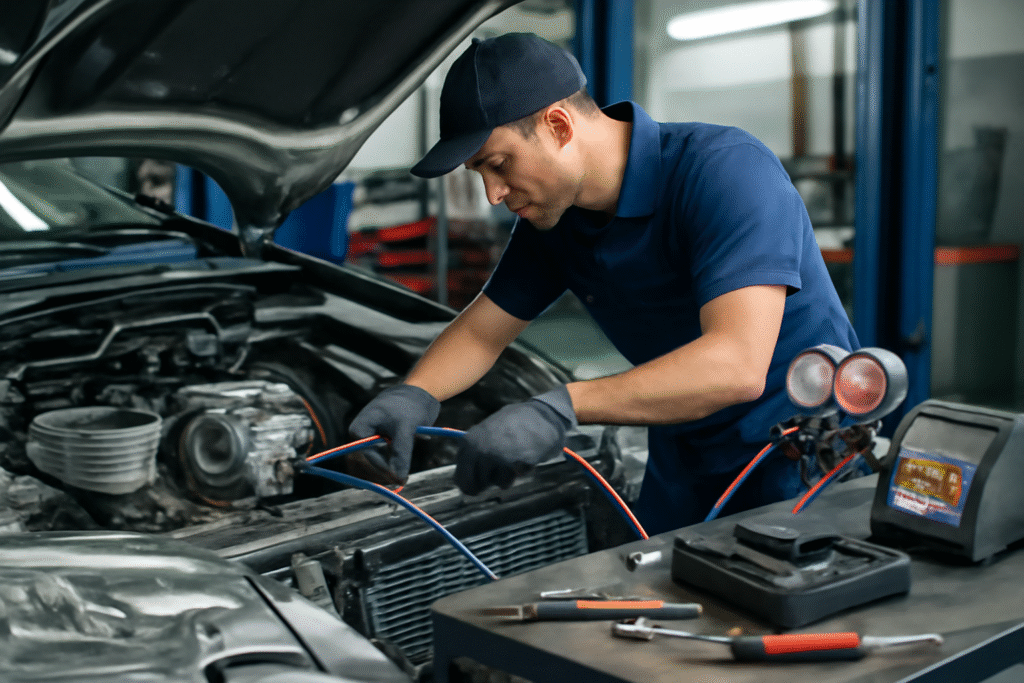
Signs Your Car AC Needs Attention
Your car’s AC system works hard to keep you cool, but sometimes it can show signs that it needs attention. Catching these issues early can save you time, money, and discomfort. Here are the key signs that your AC may need a check-up:
2.1 Weak Airflow or Warm Air
If the air coming from your AC vents feels weak or, worse, warm instead of cold, it’s a clear sign something’s wrong. This could be due to low refrigerant levels, a clogged filter, or a malfunctioning compressor. Whatever the cause, it’s time to investigate.
2.2 Strange Noises
Hearing unusual noises like grinding, rattling, or squealing when you turn on your AC? These sounds often indicate issues with the blower motor, compressor, or other internal parts of the system. Ignoring these noises can lead to more serious damage.
2.3 Unpleasant Odors
If your AC starts emitting a musty or moldy smell, it may be a sign of mold or bacteria buildup in the system. This can happen when moisture accumulates in the AC evaporator or ducts. Regular cleaning and filter replacement can help prevent this.
2.4 Frequent Need to Recharge Refrigerant
If you find yourself needing to recharge your AC’s refrigerant more often than usual, there could be a leak in the system. A refrigerant leak not only affects your AC’s performance but can also be harmful to the environment. It’s best to have a professional repair any leaks immediately.
2.5 Water Leaks Inside or Outside the Car
Noticing puddles of water on the floor mats or around the car’s exterior near the AC unit? This could be due to a clogged drain tube, which prevents condensation from draining properly. While this may not be an immediate crisis, it’s still a good idea to get it fixed to avoid water damage.
2.6 Sudden Temperature Fluctuations
If your AC is blowing cold air one minute and warm air the next, it may be a sign of an issue with the compressor or the system’s refrigerant levels. These temperature inconsistencies can be frustrating, so it’s important to have them checked out before the problem worsens.
2.7 The AC Won’t Turn On
If your AC system completely stops working—no air, no cooling—then it’s definitely time to act. This could be due to a blown fuse, a malfunctioning compressor, or a failed control module. It’s a good idea to get this inspected as soon as possible to avoid further damage.

Practical Tips for Maintaining Your Car AC System
Maintaining your car’s AC system doesn’t have to be complicated or expensive. With a few simple steps, you can ensure it runs smoothly and efficiently for years to come. Here are some practical tips to keep your AC in top shape:
3.1 Change the Cabin Air Filter Regularly
A clogged air filter is one of the easiest ways to reduce the efficiency of your AC system. The cabin air filter traps dust, dirt, and debris, but over time, it can become clogged and restrict airflow. Change the filter every 12,000 to 15,000 miles (or according to your car’s manual) to keep the air flowing freely. This small step can also improve air quality inside your car.
3.2 Run Your AC Regularly (Even in Winter)
It might seem odd, but running your AC during the colder months is essential for maintaining the system. When you run the AC, the compressor stays lubricated and the refrigerant circulates, which helps prevent seals from drying out. Even just turning it on for 10 minutes every few weeks will keep things in working order.
3.3 Clean the Condenser Coils
The condenser coils play a crucial role in your AC system’s cooling process. Over time, they can accumulate dirt, leaves, and other debris. A dirty condenser can reduce the cooling efficiency and put extra strain on your AC. Inspect the area around the condenser and gently clean it with compressed air or a soft brush to keep it clear of obstructions.
3.4 Check the Refrigerant Level
Low refrigerant levels can cause your AC to blow warm air and reduce cooling power. If you notice any decline in cooling performance, it’s worth checking the refrigerant level. While you can’t always do this yourself (it may require a professional), it’s important to know that running your AC with low refrigerant can cause long-term damage to the compressor. Keep an eye on it to prevent bigger issues.
3.5 Use the AC on the Highest Setting for a Few Minutes
When you first start your car, use the AC at its highest setting for a few minutes to remove moisture and any musty odors from the system. This helps prevent mold and bacteria buildup, keeping the air inside your car fresh. It’s a quick fix that can improve comfort and air quality.
3.6 Park in the Shade
If possible, park your car in the shade or use a sunshade to keep the interior cooler. This reduces the load on your AC when you start driving. If your car is already hot, avoid blasting the AC at full power immediately. Instead, open the windows for a few minutes to allow hot air to escape, then turn on the AC to cool things down more efficiently.
3.7 Keep Vents and Ducts Clean
Dust and debris can build up in your car’s air vents and ducts, reducing airflow and affecting your AC’s performance. Regularly clean the vents with a soft brush or vacuum attachment. This helps maintain good airflow and prevents unpleasant odors from circulating inside the cabin.
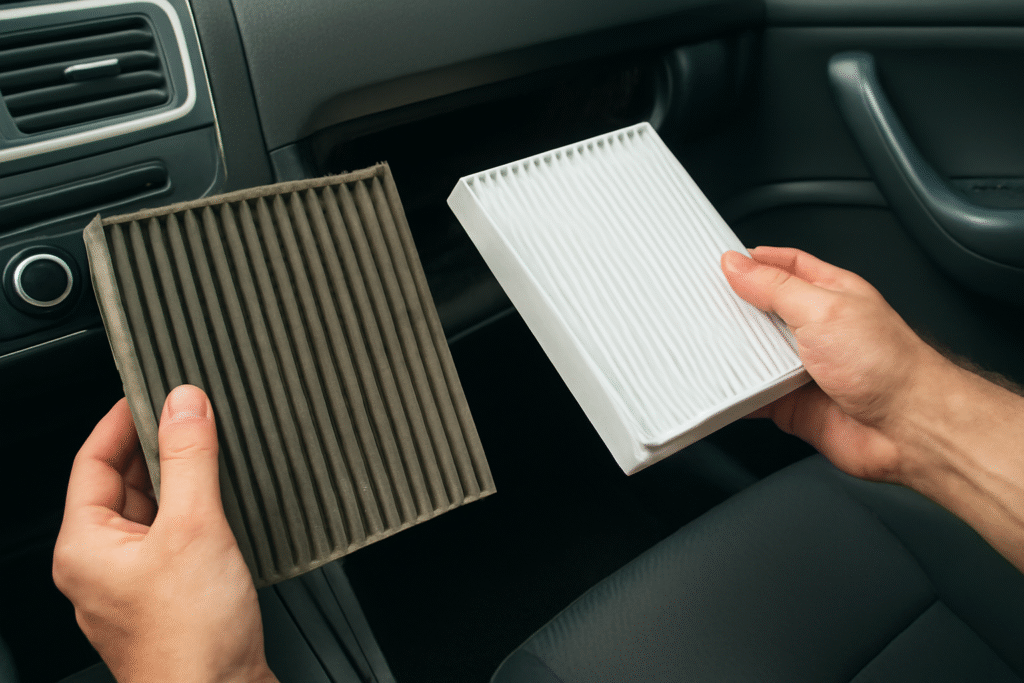
Common Mistakes That Can Damage Your Car AC
Maintaining your car’s AC system is essential, but sometimes even well-meaning actions can cause damage if you’re not careful. Avoiding these common mistakes will not only extend the life of your AC but also save you from expensive repairs. Here’s what to watch out for:
4.1 Turning Off the AC Immediately After Use
It might seem like a good idea to turn off the AC as soon as you stop driving, but doing this can actually harm your system. When you turn off the AC, moisture remains inside the evaporator, which can lead to mold and mildew growth. To prevent this, let your AC run for a minute or two before shutting it off. This helps dry out the system and keeps things fresh.
4.2 Running the AC With Low Refrigerant
If your car’s refrigerant is low, running the AC can cause serious damage to the compressor. The compressor relies on the refrigerant to keep it lubricated, and low levels can cause it to overheat or fail entirely. Always check the refrigerant level and get it recharged if necessary. If you suspect a leak, have it fixed right away.
4.3 Ignoring Strange Noises or Smells
If your AC starts making unusual noises like grinding or squealing, or if it starts emitting musty odors, don’t ignore it! These could be signs of serious issues, like a failing compressor, dirty evaporator coils, or mold buildup. Addressing these early can save you from a costly repair later.
4.4 Using the AC at Maximum Power All the Time
While it’s tempting to crank up the AC to the highest setting when it’s really hot, running the system on maximum power for extended periods can put unnecessary strain on the components, especially the compressor. Instead, use the AC at a moderate setting and adjust as needed. This will keep your system from overworking.
4.5 Failing to Replace the Cabin Air Filter
The cabin air filter traps dust, pollen, and debris, ensuring the air inside your car is clean. Over time, however, it can become clogged, reducing airflow and putting stress on your AC system. Replacing the cabin air filter regularly is an easy and affordable way to keep your AC running efficiently. If you notice reduced airflow or musty smells, it’s time for a replacement!
4.6 Not Using the AC Enough
This might sound odd, but not using your AC regularly can actually harm it. If you only use the AC during the hottest months, the compressor and other components can become dry and brittle, leading to leaks or mechanical failures. Run your AC for a few minutes each month—even in winter—to keep the system in good condition.
4.7 Overlooking Professional Maintenance
While DIY maintenance is helpful, professional inspections and servicing are just as important. Avoid waiting until something goes wrong. Regularly have a professional check your AC system, clean the condenser, and check for refrigerant leaks. This proactive care can prevent bigger issues down the line.
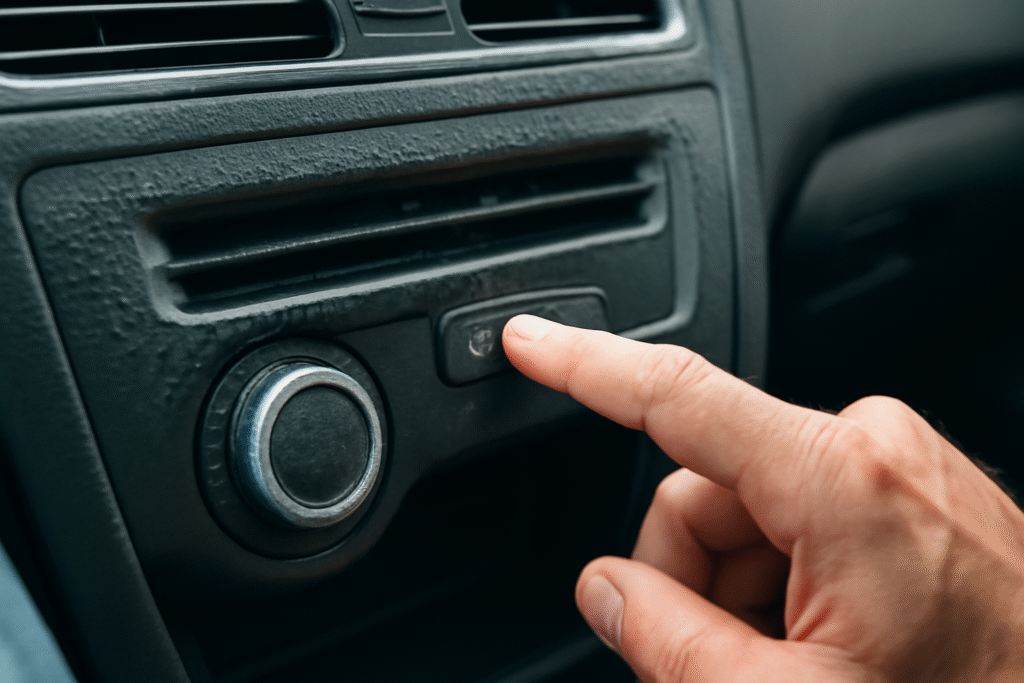
How Often Should You Service Your Car’s AC?
Regular maintenance is key to keeping your car’s AC system running efficiently, but how often should you schedule a service? The frequency of AC servicing depends on several factors, including the age of your car and how often you use the AC. Here’s a breakdown of when you should check in on your AC system:
5.1 General AC Service Every 1-2 Years
For most cars, it’s recommended to have a professional inspection and servicing every 1 to 2 years. This allows technicians to check the refrigerant levels, clean the condenser, and ensure the system is free of leaks. Even if everything seems to be working fine, a routine checkup can catch issues before they become major problems.
5.2 Check the Cabin Air Filter Annually
The cabin air filter is crucial for maintaining good air quality inside your car. It’s a good idea to replace it annually or every 12,000 to 15,000 miles, depending on your car’s usage. If you drive in dusty areas or have allergies, you may need to replace it more frequently. A clogged filter reduces airflow and puts extra strain on the AC system, so regular checks are essential.
5.3 Refrigerant Levels Every 2 Years
While you may not need to recharge your AC’s refrigerant every year, it’s important to check the refrigerant levels every 2 years. Low refrigerant can cause your AC to blow warm air and damage the compressor. If you notice any signs of refrigerant leakage or reduced cooling efficiency, don’t wait—get it checked out sooner.
5.4 Run the AC Monthly, Even in Winter
Even if you don’t use your AC much in the winter, running it at least once a month for 10 minutes will help keep the compressor and other components lubricated. This small step prevents the seals from drying out and ensures your system remains in good working condition year-round.
5.5 Monitor for Unusual Signs Between Services
While regular service is essential, it’s also important to stay vigilant between visits. If you notice any signs of malfunction—such as strange noises, weak airflow, or warm air—it’s important to schedule a service as soon as possible. Catching problems early can help prevent more serious (and expensive) repairs.
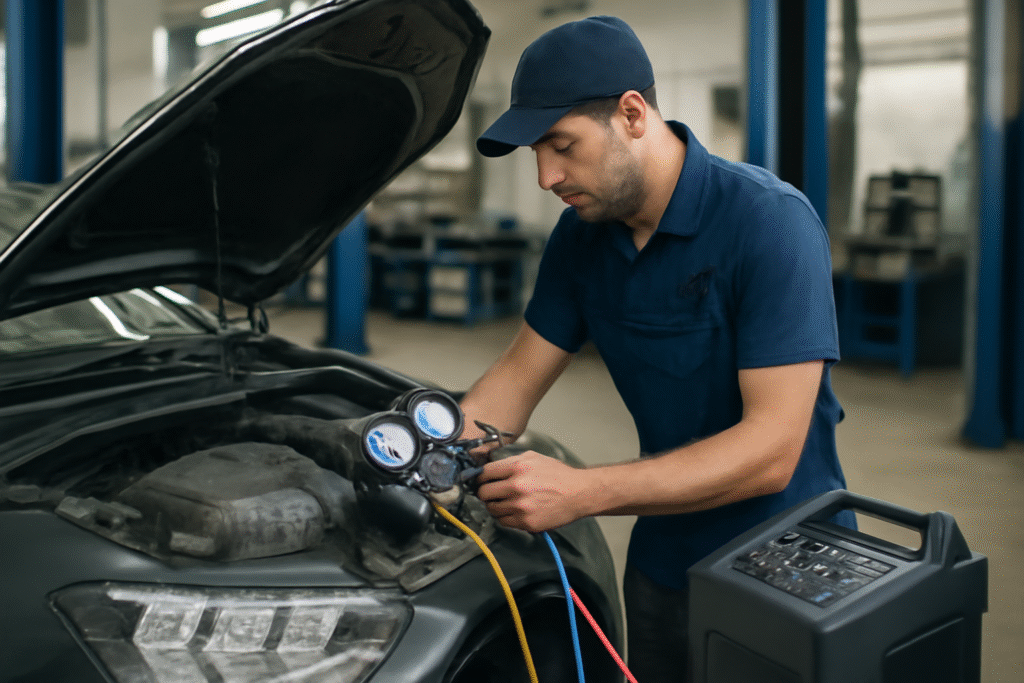
The Importance of Professional AC Service
While DIY maintenance can keep your car’s AC system in good condition, there are times when professional service is necessary. A trained technician has the knowledge and tools to catch issues that may be difficult to detect and ensure your system is working at its best. Here’s why professional AC service is so important:
6.1 Comprehensive System Inspection
A professional technician will conduct a thorough inspection of your AC system, checking for hidden issues like refrigerant leaks, compressor problems, and airflow blockages. They have the expertise to detect problems early, before they turn into expensive repairs. A quick inspection can save you a lot of trouble down the road.
6.2 Proper Refrigerant Handling
Recharging the refrigerant is not a DIY job. If you try to add refrigerant yourself, you might not do it correctly, which can damage your AC system or harm the environment. A professional service ensures that the refrigerant is topped up to the correct level and that there are no leaks. They’ll also dispose of old refrigerants properly, adhering to safety standards.
6.3 Cleaning and Deep Maintenance
Over time, dirt, dust, and debris can accumulate inside your AC system, leading to reduced airflow and efficiency. A professional service includes deep cleaning of the condenser, evaporator coils, and other key components, improving the system’s overall performance. Clean parts also help prevent mold and bacteria buildup, ensuring that the air inside your car remains fresh.
6.4 Identifying Complex Issues
Some AC problems, like a malfunctioning compressor or electrical faults, are complicated and require specialized tools to diagnose and repair. Professional technicians have access to advanced diagnostic equipment that can pinpoint the root cause of the problem. This means faster, more accurate repairs and less risk of misdiagnosis.
6.5 Ensuring Long-Term Efficiency
Regular professional maintenance ensures that your AC system operates at peak efficiency, helping you avoid frequent breakdowns and costly repairs. A well-maintained AC system doesn’t have to work as hard, which can save you money on fuel and reduce the overall wear and tear on your car.
6.6 Peace of Mind
The biggest advantage of professional AC service is the peace of mind it provides. You’ll know that your car’s AC system is in good hands and that it’s functioning at its best. No more worrying about sudden breakdowns or uncomfortable drives on hot days!
DIY vs. Professional AC Maintenance: Which Is Right for You?
When it comes to maintaining your car’s AC system, you might be wondering whether it’s better to handle it yourself or call a professional. Both DIY maintenance and professional servicing have their benefits, but knowing when to choose each one can make a big difference in your car’s AC performance—and your wallet. Here’s a breakdown to help you decide:
7.1 DIY Maintenance: Quick and Easy Fixes
DIY maintenance is perfect for simple, routine tasks that help keep your AC running smoothly without breaking the bank. These tasks are easy to do and don’t require specialized tools or expertise. Here’s what you can do yourself:
- Change the Cabin Air Filter: This is a simple and inexpensive task. A clogged filter can reduce airflow and strain your AC system, so replacing it regularly ensures better air quality and efficiency.
- Clean the Vents and Ducts: Dust and debris can accumulate in the vents, reducing airflow and causing unpleasant smells. You can use a soft brush or a vacuum attachment to clean them regularly.
- Run the AC Occasionally: Even in winter, running your AC for a few minutes each month keeps the compressor lubricated and prevents seals from drying out.
These quick fixes are low-cost, beginner-friendly, and keep your AC in good shape. Regular DIY maintenance will help avoid larger issues that require professional intervention.
7.2 Professional Maintenance: For Complex Issues and Long-Term Care
While DIY maintenance can help with basic tasks, there are times when professional servicing is necessary. A professional technician has the tools, expertise, and experience to handle more complex issues and perform a deeper cleaning. Here’s when you should call a pro:
- Refrigerant Recharge: Adding refrigerant requires the right tools and proper handling. A technician will check for leaks and ensure that your system is filled to the correct level.
- Diagnosing and Fixing Mechanical Issues: If your AC is making strange noises, blowing warm air, or not turning on, it’s best to leave the diagnosis and repair to an expert. They have the right diagnostic tools to pinpoint the issue and fix it efficiently.
- Deep Cleaning and System Checks: Professional services include cleaning the condenser, checking the compressor, and inspecting internal parts of the AC system. This ensures your system runs at peak efficiency and helps prevent major breakdowns.
7.3 When to Combine Both Approaches
In many cases, the best approach is a combination of DIY and professional care. While you can handle simple tasks like changing the air filter and running the AC monthly, a professional inspection every 1-2 years ensures that everything is running smoothly. Routine checkups by a professional will catch issues early before they turn into expensive repairs.
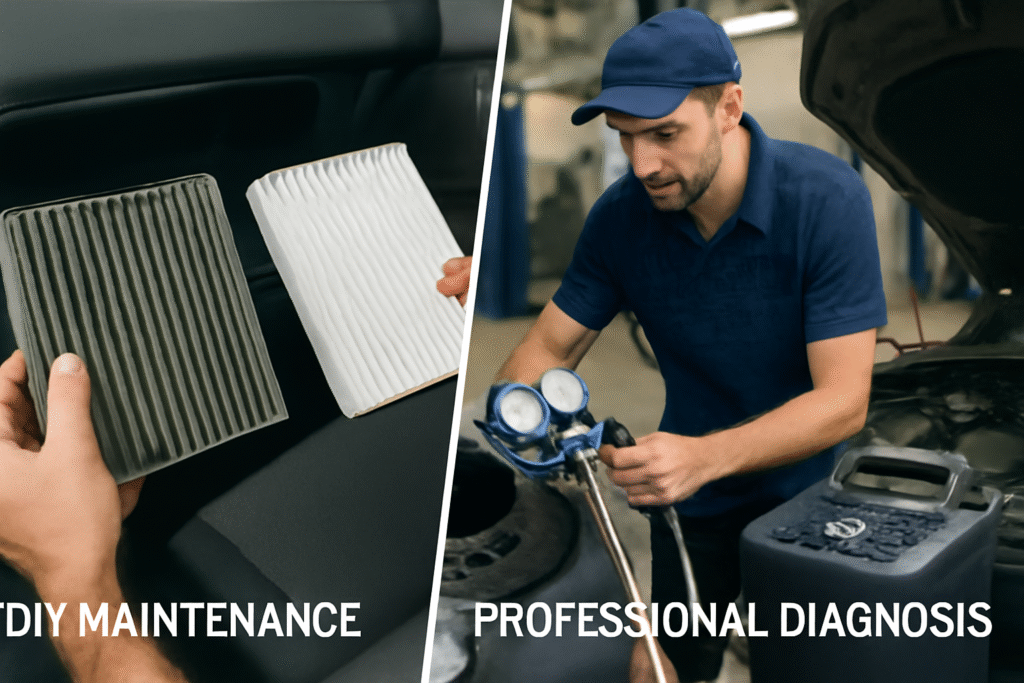
How to Save Money on AC Repairs and Maintenance
Keeping your car’s AC system in top shape doesn’t have to drain your wallet. By being proactive with maintenance and taking a few smart steps, you can save money on repairs and avoid costly fixes down the line. Here are some practical tips to keep your AC running smoothly without breaking the bank:
8.1 Stay on Top of Regular Maintenance
One of the easiest ways to save money is by scheduling regular maintenance for your AC system. An annual or biennial check-up can help catch minor issues before they turn into expensive repairs. Preventative care, like changing the cabin air filter and cleaning the condenser coils, can improve efficiency and reduce the chances of major breakdowns. Regular maintenance is cheaper than repairs and helps your system last longer.
8.2 Don’t Ignore Warning Signs
If your AC starts acting up—whether it’s blowing warm air, making strange noises, or emitting odors—don’t wait too long to address the issue. The longer you ignore the problem, the more it can escalate into something costly. Early intervention is key to avoiding bigger repairs and keeping your AC in good condition. Catching the problem early can save you from a major repair bill later on.
8.3 Use Your AC Efficiently
Overworking your AC system can lead to higher repair costs and more frequent maintenance. Here’s how to use it wisely:
- Avoid max cooling all the time: Running the AC at full power puts extra strain on the system. Set the temperature to a comfortable level and avoid pushing the system to its limits.
- Park in the shade: Parking your car in the shade or using a sunshade can help reduce the load on the AC by keeping the cabin cooler.
8.4 Shop Around for Competitive Pricing
When it’s time for professional service, don’t settle for the first quote you get. Shop around for competitive prices at trusted auto shops. You don’t have to compromise on quality to save money—many reputable garages offer affordable services. Look for promotions or seasonal discounts to lower the cost of your AC service.
8.5 Use DIY Maintenance Wisely
Certain tasks, like changing the cabin air filter or cleaning the vents, are easy to do yourself and can save you the cost of a mechanic. By staying on top of these simple DIY tasks, you’ll reduce the need for more frequent professional service. But remember, don’t take on tasks that require specialized knowledge or tools—trying to fix complicated problems yourself can lead to further damage and higher repair costs.
8.6 Invest in Quality Parts
When it’s time to replace any components, like the cabin air filter or refrigerant, it’s worth investing in quality parts that are built to last. While they might cost a bit more upfront, high-quality parts can save you money in the long run by extending the lifespan of your AC system and reducing the need for frequent repairs.

How to Improve Air Quality and Comfort in Your Car
Your car’s AC system does more than just cool the air—it also plays a big role in maintaining good air quality inside the cabin. Improving the air quality and comfort in your car can make your driving experience much more pleasant, and it’s easier than you think! Here are some simple tips to help you breathe easier and stay comfortable while on the road.
9.1 Change the Cabin Air Filter Regularly
The cabin air filter is essential for filtering out dust, pollen, and pollutants from the air inside your car. Over time, the filter can become clogged, reducing airflow and allowing contaminants to enter the cabin. To improve air quality, replace the cabin air filter every 12,000 to 15,000 miles (or according to your car’s manual). If you drive in areas with heavy pollution or allergens, consider changing it more often.
9.2 Clean Your AC Vents and Ducts
Dirty vents and ducts can spread dust, bacteria, and even mold throughout your car. Clean the air vents with a soft brush or vacuum attachment to remove dust and debris. You can also use a disinfectant wipe to clean the vents and prevent bacterial growth. Regular cleaning ensures better airflow and fresher air inside the cabin.
9.3 Use an Air Purifier
For added comfort and air quality, consider investing in a car air purifier. These devices help remove harmful particles, allergens, and odors, ensuring the air inside your car stays fresh and clean. They can be especially helpful if you suffer from allergies or drive in areas with high pollution.
9.4 Let Fresh Air In
Sometimes, all it takes to improve the air quality in your car is to let in some fresh air. Open the windows for a few minutes to let stale air escape and bring in a breeze. This is especially helpful if your AC system has been circulating the same air for a while. Just make sure to close the windows before you start using the AC again to prevent dirt and debris from entering.
9.5 Avoid Strong-Smelling Air Fresheners
While air fresheners can mask odors, they often contain chemicals that can make the air quality worse in the long run. Strong scents can also irritate your respiratory system. Instead, choose natural options like essential oils or consider a purifying air freshener that doesn’t just cover up odors but neutralizes them.
9.6 Keep the AC System Clean
A dirty AC system can lead to mold and mildew buildup, which affects both air quality and comfort. Regularly clean the evaporator coils and the condenser to prevent moisture from accumulating. If you notice any musty smells coming from the AC, it may be a sign that it’s time for a deep clean. A professional service can help with this to ensure your system stays fresh and efficient.
Maintaining your car’s AC system is essential for both comfort and cost savings. Regular maintenance not only ensures that your vehicle remains cool and comfortable but also helps avoid expensive repairs in the long run. By staying on top of simple tasks like replacing filters, checking refrigerant levels, and running the AC regularly, you can extend the lifespan of your system, improve air quality, and enhance fuel efficiency. Taking the time to care for your AC today will give you peace of mind and a smoother, more enjoyable driving experience for years to come.
Frequently Asked Questions (FAQ)
1. How do I know if my car AC needs recharging?
If your car’s AC blows warm air, has weak airflow, or requires frequent recharges, it may need refrigerant. A drop in cooling performance is a clear sign that the refrigerant level is low, and it’s time for a recharge.
2. How often should I replace the cabin air filter in my car AC?
It’s recommended to replace your cabin air filter every 12,000 to 15,000 miles, or at least once a year. A clogged filter can reduce airflow, lower AC efficiency, and affect air quality inside the car.
3. Can I use my car AC in winter?
Yes, running your AC in winter is actually beneficial. It helps keep the system lubricated, prevents the seals from drying out, and maintains overall performance. It also helps to remove humidity, preventing the windows from fogging up.
4. What causes a bad smell coming from the car AC?
A musty or foul smell usually indicates mold or mildew buildup in the AC system, often caused by trapped moisture. Regularly cleaning the system and replacing the cabin air filter can help prevent odors.
5. How can I improve my car’s AC cooling performance?
To boost cooling, ensure your AC’s condenser coils are clean and free from debris. You should also check refrigerant levels, avoid running the AC at max cooling for long periods, and replace the cabin air filter regularly to maintain optimal airflow.
6. Can I fix a noisy car AC on my own?
Strange noises from the AC may indicate a problem with the compressor, blower fan, or refrigerant levels. While simple issues like debris in the vents can be fixed yourself, mechanical issues should be handled by a professional to prevent further damage.
7. How do I maintain the refrigerant level in my car AC?
Refrigerant levels should be checked periodically, typically every 2 years. If levels are low, it’s a good idea to have a professional recharge the system to ensure it operates efficiently and avoids compressor damage.
8. How much does it cost to repair a car AC?
AC repairs can range from $100 for minor fixes like replacing a cabin air filter, to over $1,000 for major issues like compressor replacement. Regular maintenance helps prevent expensive repairs, so staying on top of AC care can save you money in the long run.






















